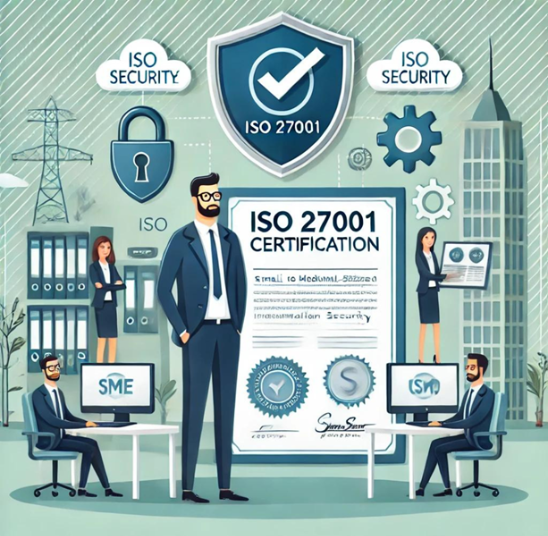Myth 3: ISO 27001 Certification Guarantees No Data Breaches
Reality:
While ISO 27001 certification is a powerful tool for enhancing information security, it does not guarantee complete immunity from data breaches. It’s important to understand that ISO 27001 helps organizations establish a systematic approach to managing sensitive information, but it doesn’t make them invincible. Even with robust security measures in place, the evolving nature of cyber threats means that no organization is entirely safe from potential breaches.
Real-World Example: A Software Company’s Experience
Consider a mid-sized software company that specializes in developing enterprise solutions for clients across various industries. The company had recently achieved ISO 27001 certification, which gave them confidence in their security measures and allowed them to attract larger clients who required strong security assurances.
The Breach:
Despite their ISO 27001 certification, the company fell victim to a sophisticated phishing attack. An employee inadvertently clicked on a malicious link in an email that appeared to be from a trusted client. This led to the installation of malware that compromised a significant portion of the company’s internal systems, including sensitive customer data.

Response and Lessons Learned:
Thanks to their ISO 27001-compliant Information Security Management System (ISMS), the company had an incident response plan in place. They quickly activated their response team, identified the breach, and began mitigating the damage. The company notified affected customers, contained the malware, and worked with cybersecurity experts to remove the threat.
In the aftermath, the company conducted a thorough review of the incident and realized that while their ISMS was effective in managing the situation, there were gaps in their phishing awareness training and email filtering processes. They updated their training programs to better educate employees about phishing threats and enhanced their technical controls to prevent similar attacks in the future.
Conclusion:
This example underscores the importance of viewing ISO 27001 certification as part of an ongoing security journey rather than a guarantee of absolute security. While the certification provided the company with a strong foundation for managing security risks, continuous vigilance, training, and improvement were essential to protecting their systems from evolving threats.

Myth 4: ISO 27001 is Just About Technology
A common misconception is that ISO 27001 focuses solely on technology. Many people believe that information security is all about firewalls, encryption, and antivirus software. While these are important elements, ISO 27001’s scope is far broader.
I. Reality: ISO 27001 Integrates People, Processes, and Technology
ISO 27001 is not just about implementing the right technology—it’s about creating a holistic approach to information security management. The standard emphasizes that technology alone cannot protect an organization’s information. A comprehensive strategy must also involve people and processes.
Key Components Beyond Technology:
People: Workers are essential to information security. ISO 27001 includes requirements for training, awareness, and establishing a culture of security within the organization. This minimizes the possibility of insider threats and human error.
Processes: ISO 27001 outlines the importance of well-defined processes. These processes ensure that security measures are consistently applied, monitored, and improved. Examples include incident response procedures, access control protocols, and regular audits.
Technology: While technology is essential, it’s just one part of the equation. The technology must be aligned with the organization’s overall security strategy and supported by strong processes and trained personnel.

Example: A Comprehensive Approach in Action by a Healthcare organization
Consider an organization in the healthcare sector. They implemented ISO 27001, focusing on more than just securing their IT systems. They also trained their staff to recognize phishing attempts and established clear procedures for handling sensitive patient data. By integrating people, processes, and technology, they significantly reduced the risk of data breaches and improved their overall security posture.
Conclusion:
ISO 27001 is much more than a technical standard. It’s a framework for holistically managing information security. By addressing the interplay between people, processes, and technology, organizations can build a robust defense against a wide range of security threats. Understanding this comprehensive approach is key to leveraging the full benefits of ISO 27001.

Myth 5: ISO 27001 Compliance is a One-Time Effort
A common misconception is that once an organization achieves ISO 27001 certification, the job is done. Some believe that compliance is a one-time project, and after certification, no further action is necessary. This is far from the truth.
I. Reality: ISO 27001 Compliance is a Continuous Journey
ISO 27001 is designed to ensure that information security management is an ongoing process. Achieving certification is just the beginning. The standard requires regular monitoring, reviews, and updates to ensure that the Information Security Management System (ISMS) remains effective in the face of evolving threats and organizational changes.
Why Continuous Commitment is Essential:
Evolving Threat Landscape: Cyber threats are constantly changing. It is possible that what was safe yesterday is not safe now. Regular updates to security measures and processes are necessary to protect against new vulnerabilities.
Organizational Changes: As organizations grow and evolve, so do their information security needs. New technologies, business processes, and personnel changes can introduce new risks, making it essential to regularly review and update the ISMS.
Annual Audits and Reviews: ISO 27001 requires organizations to undergo regular internal audits and management reviews. These processes help identify areas for improvement and ensure that the ISMS adapts to any changes in the organization or its external environment.

II. Real-Time Example: A Dynamic Approach to Compliance
Consider a technology company that achieved ISO 27001 certification three years ago. Initially, they implemented strong security controls and documented procedures. However, the company has since expanded into new markets, adopted cloud-based solutions, and hired additional staff. Recognizing the need to adapt, the company regularly revisits its ISMS, conducts internal audits, and makes necessary updates to address these changes. This ongoing commitment ensures that their information security practices remain robust and effective.
One year, during a routine internal audit, they discovered a gap in their cloud security due to a new third-party integration. Because they had a process for continuous improvement, they quickly addressed the gap, updated their security controls, and enhanced staff training on the new system. This proactive approach not only kept them compliant but also prevented potential security breaches.
Conclusion:
ISO 27001 compliance is not a one-time task but a continuous process that demands ongoing attention and commitment. Organizations must regularly review and update their security practices to stay ahead of emerging threats and changes in the business environment. Embracing this ongoing journey is key to maintaining a strong and effective information security posture.
Myth 6: ISO 27001 is Only for Large Organizations
A widespread myth is that ISO 27001 is a standard primarily suited for large enterprises with substantial resources. The belief that only large organizations can implement and maintain an Information Security Management System (ISMS) often discourages small and medium-sized enterprises (SMEs) from pursuing ISO 27001 certification. However, this perception is not accurate.
I. Reality: ISO 27001 is Equally Applicable to SMEs
ISO 27001 is a flexible standard that can be tailored to fit organizations of any size. For SMEs, the implementation of ISO 27001 can be a strategic move, offering numerous benefits that go beyond just security. It enhances credibility, builds customer trust, and can even be a key differentiator in a competitive market.

Key Benefits for SMEs:
Enhanced Credibility and Trust: In today’s business environment, customers and partners increasingly demand strong information security practices. ISO 27001 certification demonstrates that an SME takes data protection seriously, which can build trust and open doors to new business opportunities.
Competitive Advantage: Many SMEs operate in highly competitive markets. Achieving ISO 27001 certification can set an SME apart from its competitors, making it more attractive to clients who prioritize security.
Scalable Implementation: The ISO 27001 standard is designed to be scalable. SMEs can implement it in a way that aligns with their specific needs and resources. The focus can be on the most critical areas of the business, making the process more manageable.
II. Real-Time Example: An SME’s Journey to ISO 27001 Certification
Consider a small marketing agency with 20 employees that handles sensitive client data, including personal information and proprietary marketing strategies. Initially, the agency believed that ISO 27001 was out of reach due to its size. However, after facing questions from potential clients about their data protection measures, the agency decided to pursue ISO 27001 certification.
They began by assessing their current security practices and identifying gaps. With a clear plan, they implemented ISO 27001 in phases, starting with the most critical processes. The agency also involved all employees in security training to ensure everyone understood the importance of data protection.
Within a year, the agency achieved ISO 27001 certification. As a result, they not only strengthened their security posture but also won new contracts with clients who required certified partners. The investment in ISO 27001 paid off by enhancing their reputation and enabling growth in a competitive market.
Conclusion:
ISO 27001 is not just for large organizations. SMEs can also benefit significantly from certification, gaining credibility, trust, and a competitive edge. By tailoring the standard to their specific needs, SMEs can implement ISO 27001 in a cost-effective and scalable manner, proving that strong information security is within reach for businesses of all sizes.


